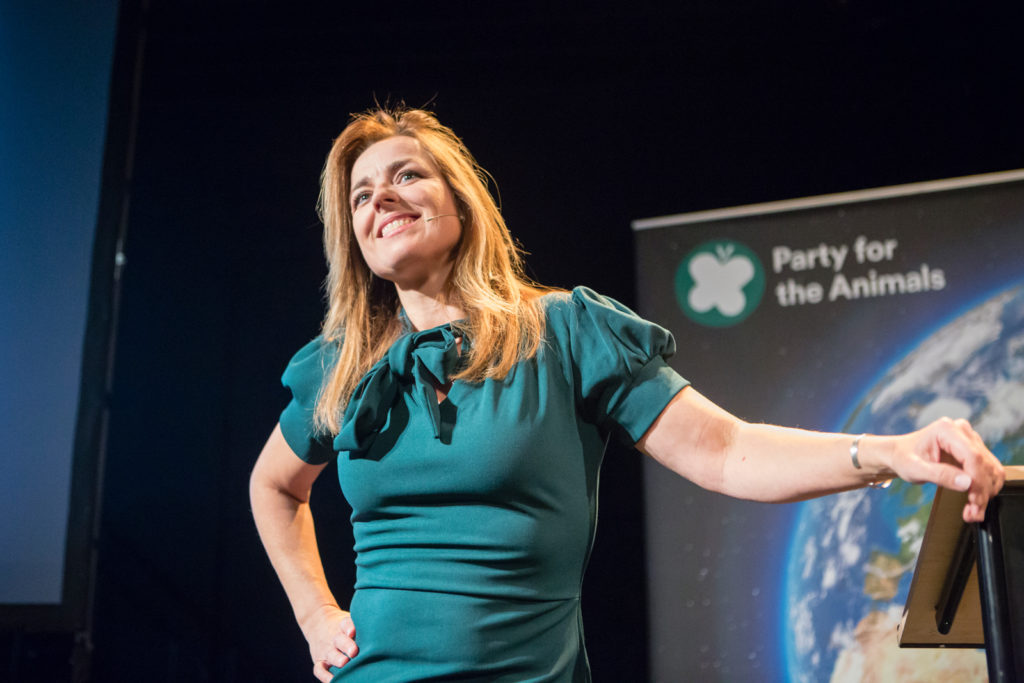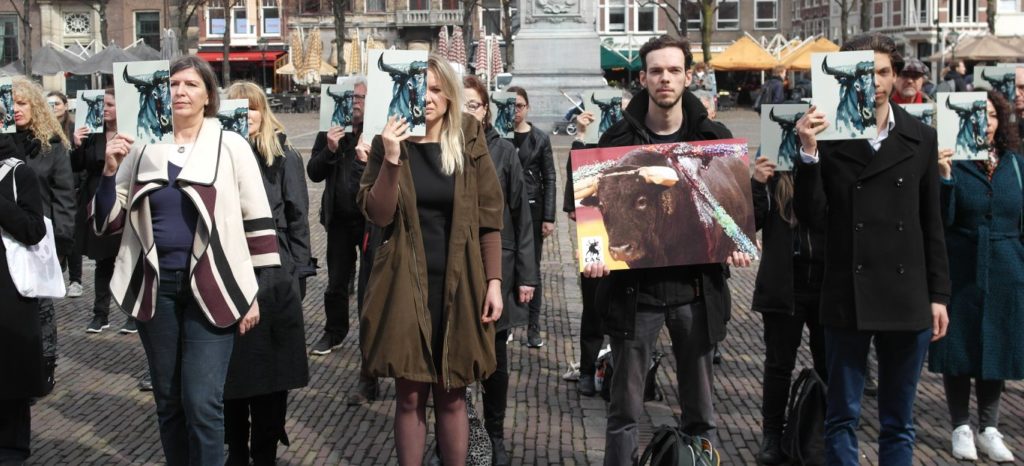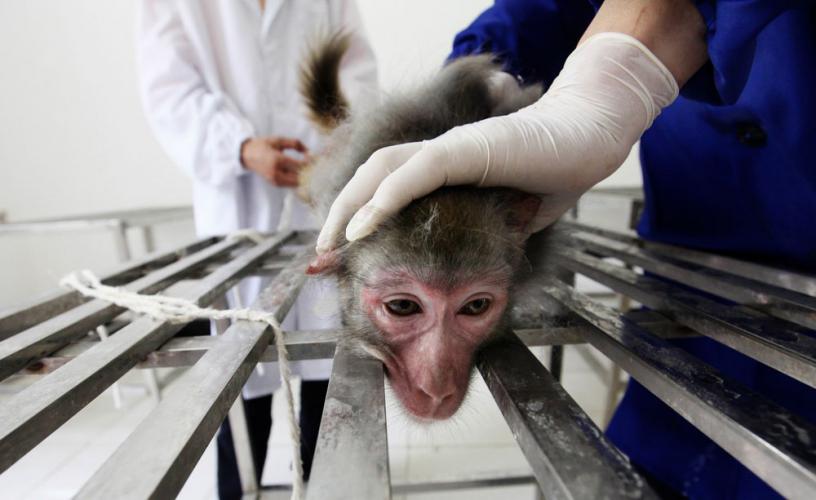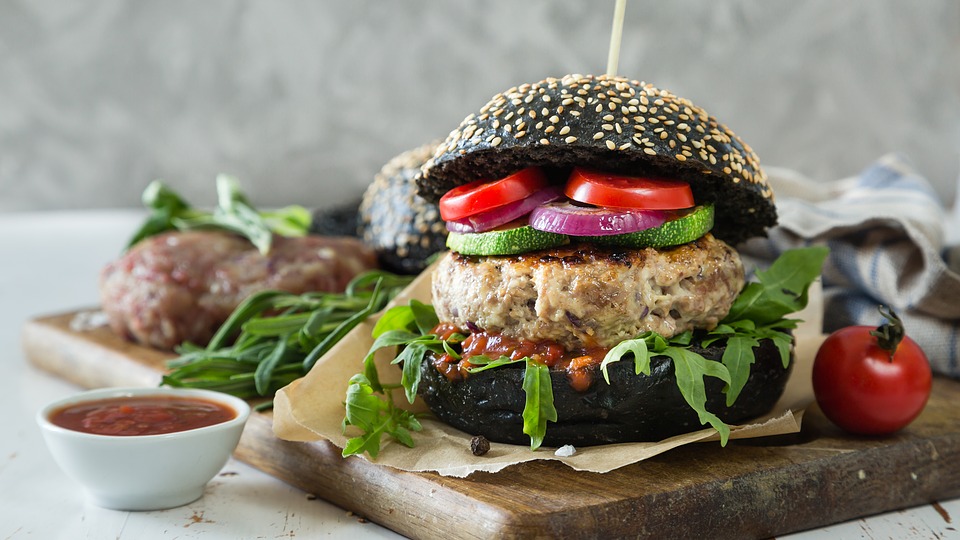وورلد لوغ ماريان ثيم 1 مايو 2018
The 22nd of April was International Earth Day. On that day, people all over the world reflect on all the beauty of the earth. Such a day demonstrates well that the problems surrounding nature, environment and climate change are transboundary and that we should collaborate to tackle these problems. I see that such awareness is growing, wherever I go. Just recently, I was in Sweden and Germany to give lectures. I was invited to Sweden by our sister party Djurens parti and to Germany by a theological university. The lecture in Germany was attended by visitors from Georgia, Hungary, the Czech Republic and Ghana among others. It’s wonderful to see that increasingly more people from different backgrounds are demanding a different kind of politics: politics focussed on sustainability and compassion instead of economic growth.

Marianne during her lecture in Sweden
Together we are in strong position: This is also demonstrated by the fight against bullfighting. Thanks to an international campaign conducted by CAS International, the European Parliament decided in 2015 that the European Union must stop its subsidies for bullfighting. The Dutch Lower House already accepted our motion to stop those subsidies in 2013. The European Commission has, however, ignored the wish of the European Parliament for years. But the EU subsidy policy is currently being reviewed, so there’s a chance again that the European Commission will decide not to invest any more money in the bullfighting industry. On the 4th of April, CAS International protested against the current European subsidies, opposite the Lower House, and our MEP Anja Hazekamp attended this protest, together with our member of the Lower House, Femke Merel Arissen. You, as a citizen, can also help to pressure European policy makers: sign the petition against the European subsidies for bullfighting here !

Femke Merel and Anja Hazekamp of the Party for the Animals at the protest against subsidies for bullfighting
The 24th of April was World Lab Animals Day. Worldwide, the number of animals that are used in animal testing is estimated at 115 million every year, of which 12 million animals are used in Europe. The Netherlands even has the largest Primate Testing Lab of Europe, the BPRC. 1500 monkeys are used there in gruesome experiments. Some monkeys get electrodes placed in their heads while others are made ill with the most horrifying diseases. We have drawn attention to what’s happening to those monkeys but also to the millions of other animals that are pointlessly used as testing animals all over the world. The Dutch government has said before that the Netherlands must be frontrunner in research without animal testing. So, it’s odd that an institute such as BPRC is still open.
Certainly, in these times of quick innovations and technological developments, there are sufficient alternatives for animal testing, but our governments refuse to invest enough money into them. We keep pressuring the government and the EU to stop the cruelties in the animal testing industry!

Experiments on monkeys
Almost half of all grains and vegetable proteins that are grown all over the world are fed to farming animals. What a waste of farming land, water and food that humans could eat directly. Our huge meat consumption is decadent. Even the most mainstream institutes and companies are now aware of this. The authoritative institute the World Food Organisation already sounded the alarm bell because the livestock industry poses a threat to our food security, nature and the environment. This month, the Council for the Living Environment and Infrastructure (an important advisory council of the Dutch government) adopted an urgent advice: the livestock industry must be considerably decreased to be able to achieve the Paris climate objectives and consumers must make their contributions too by consuming less meat and dairy products.

Vegan burger
But despite this scientific advice of its own advisory council, the Dutch government is hiding its head in the sand again and is ignoring the advice. The government’s intense lobbying this month even achieved that Dutch veal meat can be exported to China again. One of the most climate-, environmentally and animal-unfriendly measures a government can take. But fortunately, we see that others do dare to contribute to a positive change for humankind, animals and the environment. Increasingly more companies and educational institutes aim at local, organic and vegetable products. Read here the article of The Guardian about how veganism is becoming more mainstream.
Until the next time!
Marianne
22 أبريل ، كان اليوم العالمي للأرض. في هذا اليوم ، يقف الناس في جميع أنحاء العالم على حقيقة جمال الأرض. يوم كهذا يظهر بوضوح أن المشاكل المحيطة بالطبيعة والبيئة وتغير المناخ عابرة للحدود وأن علينا العمل معاً للتعامل معها. أينما أذهب، أرى أن هذا الوعي ينمو أكثر وأكثر. مؤخرا كنت في السويد وألمانيا لإلقاء محاضرة هناك. في السويد دعيت من قبل الحزب الشقيق ضجورينس پارتي وفي ألمانيا بدعوة من جامعة لاهوتية. حظر محاضرة ألمانيا زوار من جورجيا، المجر، جمهورية التشيك وغانا. إنه لأمر رائع أن نرى أن هناك المزيد من الأشخاص من مختلف الخلفيات يطالبون بنوع مختلف من السياسة: السياسة التي تهدف إلى الاستدامة والتعاطف بدلاً من النمو الاقتصادي.

معا نحن أقوياء: هذا ما تراه أيضا في مكافحة مصارعة الثيران. بفضل الحملة الدولية التي قادتها لجنة مكافحة مصارعة الثيران العالمية ، قرر البرلمان الأوروبي في عام 2015 أن الاتحاد الأوروبي يجب أن تتوقف عن منح الدعم لمصارعة الثيران. بالفعل في عام 2013 ، اعتمد مجلس النواب الهولندي أيضا اقتراحنا لوقف هذه الإعانات. ومع ذلك ، تجاهلت المفوضية الأوروبية رغبة البرلمان الأوروبي لسنوات. ولكن حاليا يتم النظر في سياسة الدعم الأوروبي مرة أخرى، حيث فرصة أخرى أن تقرر المفوضية الأوروبية حقا رفض أي مبلغ من المال للاستثمار في صناعة مصارعة الثيران. في 4 أبريل احتجت لجنة مكافحة مصارعة الثيران العالمية أمام البرلمان في لاهاي ضد الإعانات الأوروبية الحالية وحضرت برلمانيتنا الأوربية إنجا حازيكامپ هذا الاحتجاج ، مع عضو مجلس النواب فامك ميرل إريسين. أنت أيضا كمواطن يمكن أن تساعد في وضع صانعي السياسة الأوروبيين تحت الضغط: وقع على الالتماس ضد الإعانات الأوروبية التي تذهب إلى مصارعة الثيران!

فامك ميرل وإنجا حازيكامپ من حزب من أجل الحيوانات أثناء الإحتجاج على الإعانات لمصارعة الثيران
في 24 أبريل كان يوم العالمي للتجارب على الحيوانات. على مستوى العالم ، يقدر عدد الحيوانات المستخدمة في التجارب على الحيوانات بـ 115 مليون ، منها 12 مليون في أوروبا. هولندا لديها أكبر مركز اختبار قرود في أوروبا ، وهو مركز أبحاث الطب الحيوي الرئيسي. هناك 1500 من القرود تستخدم في تجارب بشعة. تحصل القرود على أقطاب كهربائية في رؤوسهم وتصاب القرود الأخرى بأمراض رهيبة. لقد وجهنا الانتباه إلى مصير هؤلاء القرود ، ولكن أيضًا إلى ملايين الحيوانات الأخرى التي تُستخدم بلا معنى كحيوانات اختبار في جميع أنحاء العالم. وقد سبق للحكومة أن قالت أنه بحلول عام 2025 يجب أن تكون هولندا في طليعة الأبحاث دون اختبار على الحيوانات. إذا كيف نوضح أنه لا تزال هناك مؤسسة مثل مركز أبحاث الطب الحيوي الرئيسي مفتوحة.
بالتأكيد في هذه الأوقات من الابتكارات السريعة والتطورات التكنولوجية ، هناك بدائل كافية للاختبار بدل الحيوانات ، لكن حكوماتنا ترفض استثمار ما يكفي من المال هناك. نواصل الضغط على الحكومة والاتحاد الأوروبي لوضع حد لفظائع صناعة اختبار الحيوانات!

تجارب على القرود
يتم إعطاء ما يقرب من نصف جميع الحبوب والبروتينات النباتية التي تزرع في العالم لحيوانات المزرعة. يالها من مضيعة للأراضي الزراعية، المياه والأطعمة التي يمكن أن يأكلها الناس مباشرة! وبالتالي ، فإن استهلاكنا الهائل للحوم منحط. أصبح هذا الآن واضح لمعظم الوكالات والشركات الرئيسية. وكان المعهد الرسمي ، منظمة الأغذية العالمية ، قد دق ناقوس الخطر بالفعل لأن صناعة الثروة الحيوانية تشكل تهديدا كبيرا لأمننا الغذائي ، طبيعتنا ، وبيئتنا. في هذا الشهر ، أصدر مجلس البيئة والبنية التحتية (وهو أيضًا مجلس استشاري مهم في الحكومة الهولندية) نصيحة عاجلة: يجب أن يتقلص القطيع بشكل كبير لتحقيق أهداف المناخ في باريس ، ويجب أن يساهم المستهلكون أيضًا في تقليل استهلاك اللحوم والألبان.

برغر نباتي
على الرغم من هذه المشورة العلمية من مجلسها الاستشاري ، فإن الحكومة الهولندية تضع رأسها مرة أخرى في الرمال وترفض النصيحة. حرصت الحكومة الهولندية هذا الشهر بلوبي قوي جدا على إمكانية تصدير لحم العجل الهولندي إلى الصين مرة أخرى. واحدة من أكثر التدابير غير الودية للمناخ، البيئة والحيوانات التي يمكن أن تتخذها الحكومة. لحسن الحظ ، نرى أن الآخرين يجرؤون على المساهمة في تغيير إيجابي للناس، الحيوانات والبيئة. تركز المزيد من الشركات والمؤسسات التعليمية على المنتجات المحلية، العضوية والنباتية. إقرأ هنا مقال من صحيفة الجارديان حول كيف أصبحت المواد النباتية أكثر شيوعا.
إلى المرة القادمة!
ماريان